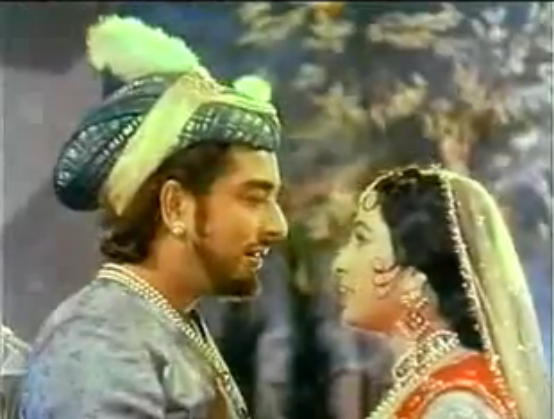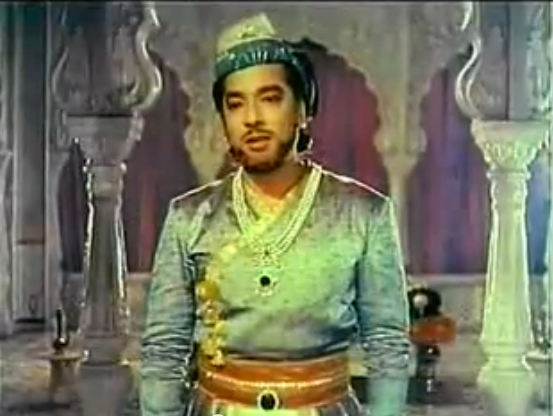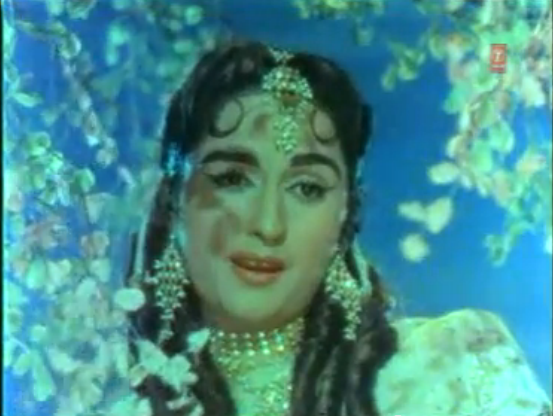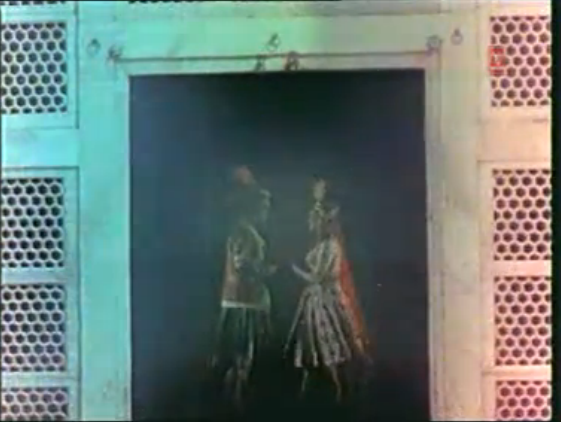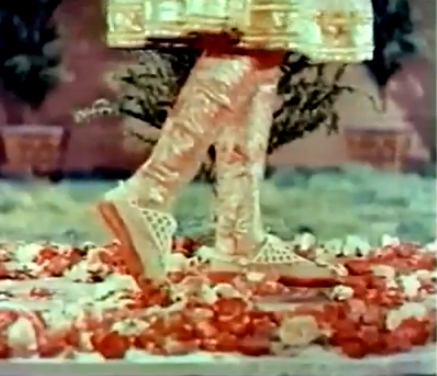In the spirit of Valentine’s Day 2014, we continue our series on Taj Mahal (1963) with the lyrics and English translation to the film’s most popular song: jo vaadaa kiyaa. For our previous posts on this film, please see our translations of khudaa-e-bartar, jurm-e-ulfat pe, and paa.nv chhuu lene do.
As its name suggests, Taj Mahal (1963) directed by M. Sadiq tells one of the greatest love stories in India’s history: how Mughal emperor Shah Jahan (played by Pradeep Kumar) fell in love with his (third!) wife Mumtaz Mahal a.k.a Arjumand Banu Begum (played by Bina Rai) and eventually built the Taj Mahal in her memory following her demise. While the film’s historical — yet often fictional — narrative earned commercial success and critical acclaim, it is mostly remembered today for its soundtrack composed by Roshan and penned by Sahir Ludhianvi.
It is no surprise that this immortal duet sung by Lata Mangeshkar and Mohammed Rafi earned the well-deserved #1 position in Binaca Geet Mala for the year of 1963. In fact, this song was played for so long on Binaca Geet Mala that the program had to change its rules regarding the maximum number of weeks that a single song could be featured on the list! Ever since, this blockbuster song, tuned to Raga Pahadi, has remained an all-time romantic favorite in Hindi cinema. Although some may consider its charm to be hampered by overexposure, even the most diehard fans may be surprised to learn that this song has two additional versions featuring lyrics that differ from those in the song’s most popular version. Among the three renditions found in the film, my personal favorite is the “sad” version (transcribed as Version 2 below). I mean, how could you not love that beautiful Lata alaap played as Bina Rai’s spirit descends from the Moon to meet Pradeep Kumar?
Will the romance of this song be enough to charm your sweetheart on Valentine’s Day this year? Share this poetry with that special someone and you’re guaranteed to score some major points from him or her today! Until next time…
-Mr. 55
Jo Wada Kiya Woh Nibhana Padega (Version 1): Lyrics and Translation
jo vaadaa kiyaa vah nibhaanaa paDegaa
You must fulfill the promise that you made.
roke zamaanaa chaahe, roke khudaayii
Should society or divinity attempt to stop you,
tum ko aanaa paDegaa
you must still come to me.
tarastii nigaaho.n ne aavaaz dii hai
My pining eyes have called out to you.
muhabbat kii raaho.n ne aavaaz dii hai
The paths of love have called out to you.
jaan-e-hayaa, jaan-e-adaa, chhoDo tarsaana
Oh beloved, please stop tormenting me.
tum ko aanaa paDegaa
You must come to me.
jo vaadaa kiyaa vah nibhaanaa paDegaa
You must fulfill the promise that you made.
yah maanaa hame.n jaa.n se jaanaa paDegaa
I accept that I must leave this life.
par yah samajh lo tum ne jab bhii pukaaraa
But understand this: whenever you call out to me,
ham ko aanaa paDegaa
I must come to you.
jo vaadaa kiyaa vah nibhaanaa paDegaa
I must fulfill the promise that I made.
ham apnii vafaa pe na ilzaam le.nge
I will not tolerate accusations concerning my fidelity.
tumhe.n dil diyaa hai, tumhe.n jaa.n bhii de.nge
I have given you my heart, and I can offer you my life too.
jab ishq kaa saudaa kiyaa, phir kyaa ghabraanaa?
When I have already bargained with love, what is there to fear?
ham ko aanaa paDegaa
I must come to you.
jo vaadaa kiyaa vah nibhaanaa paDegaa
I must fulfill the promise that I made.
chamakte hai.n jab tak yah chaa.nd aur taare.n
As long as the Moon and stars continue to shine,
na TuuTe.nge ahd-o-paimaa.n hamaare
our promises and pledges will not be broken.
ek-duusraa jab de sadaa hoke diivaanaa
When one of us calls the other in the pangs of love,
ham ko aanaa paDegaa
we must come to each other.
jo vaadaa kiyaa vah nibhaanaa paDegaa
We must fulfill the promise that we made.
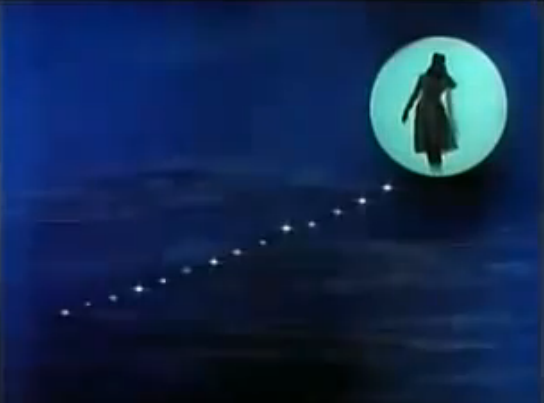
Bina Rai’s spirit descends from the heavens to come meet Pradeep Kumar in his old age in Taj Mahal (1963).
Jo Wada Kiya Woh Nibhana Padega (Version 2): Lyrics and Translation
jo vaadaa kiyaa vah nibhaanaa paDegaa
You must fulfill the promise that you made.
roke zamaanaa chaahe, roke khudaayii
Should society or divinity attempt to stop you,
tum ko aanaa paDegaa
you must still come to me.
sabhii ahal-e-duniyaa yah kahte hai.n ham se
All the people of the world tell me that
ki aataa nahii.n hai koi muD ke adam se
no one returns from the next world.
aaj zaraa shaan-e-vafaa dekhe zamaanaa
Today, let this world see the splendor of faithfulness.
tum ko aanaa paDegaa
You must come to me.
jo vaadaa kiyaa vah nibhaanaa paDegaa
You must fulfill the promise that you made.
yah maanaa hame.n jaa.n se jaanaa paDegaa
I accept that I must leave this life.
par yah samajh lo tum ne jab bhii pukaaraa
Yet, understand this: whenever you call out to me,
ham ko aanaa paDegaa
I must come to you.
jo vaadaa kiyaa vah nibhaanaa paDegaa
I must fulfill the promise that I made.
ham aate rahe hai.n, ham aate rahe.nge
I have been coming to you, and I will continue to do so eternally.
muhabbat kii rasme.n nibhaate rahe.nge
I will continue to fulfill the duties of love.
jaan-e-vafaa, tum do sadaa phir kyaa Thikanaa?
Oh beloved, at which dwelling shall we meet when you call?
ham ko aanaa paDegaa
I must come to you.
jo vaadaa kiyaa vah nibhaanaa paDegaa
I must fulfill the promise that I made.
Jo Wada Kiya Woh Nibhana Padega (Version 3): Lyrics and Translation
jo vaadaa kiyaa vah nibhaanaa paDegaa
You must fulfill the promise that you made.
roke zamaanaa chaahe, roke khudaayii
Should society or divinity attempt to stop you,
tum ko aanaa paDegaa
you must still come to me.
yah maanaa hame.n jaa.n se jaanaa paDegaa
I accept that I must leave this life.
par yah samajh lo tum ne jab bhii pukaaraa
Yet, understand this: whenever you call out to me,
ham ko aanaa paDegaa
I must come to you.
jo vaadaa kiyaa vah nibhaanaa paDegaa
I must fulfill the promise that I made to you.
hamarii kahaanii tumhaaraa fasaanaa
My story and your tale
hameshaa hameshaa kahegaa zamaanaa
will be narrated eternally by the world.
kaisii balaa kaisii sazaa, ham ko hai aanaa
Whatever misfortune or punishment falls upon me, I must come.
ham ko aanaa paDegaa
I must come to you.
jo vaadaa kiyaa vah nibhaanaa paDegaa
I must fulfill the promise that I made.
jo vaadaa kiyaa vah nibhaanaa paDegaa
You must fulfill the promise that you made.
roke zamaanaa chaahe, roke khudaayii
Should society or divinity attempt to stop you,
tum ko aanaa paDegaa
you must still come to me.
*Female lines in red are sung by Lata Mangeshkar. Male lines in green are sung by Mohammed Rafi. Lines in black are sung together by Lata Mangeshkar and Mohammed Rafi.
Glossary
vaadaa nibhaanaa: to fulfill a promise; roknaa: to stop; zamaanaa: society, world; khudaayii: divinity; tarasnaa: to pine; nigaah: eyes; aavaaz denaa: to call out; muhabbat: love; raah: path; jaan-e-hayaa: beloved; jaan-e-adaa: beloved; tarsaanaa: to torment; maanna: to accept; jaha.n: world; samajh lenaa: to understand; pukaarnaa: to call out; vafaa: fidelity, faithfulness; ilzaam: accusations; ishq; love; saudaa karnaa: to bargain; ghabraanaa: to fear; chamaknaa: to shine; TuuTnaa: to break; ahd-o-paimaa.n: promises and pledges; sadaa denaa: to call; diivaanaa: mad, crazy in love; ahal-e-duniyaa: people of the world; muD ke aanaa: to return; adam: non-existence, the next world; shaan-e-vafaa: splendor of faithfulness; rasm: duty, rule; jaan-e-vafaa: beloved; Thikaanaa: dwelling, place; kahaanii: story; fasaanaa: tale; hameshaa: always, eternally; balaa: misfortune, calamity; sazaa: punishment.

